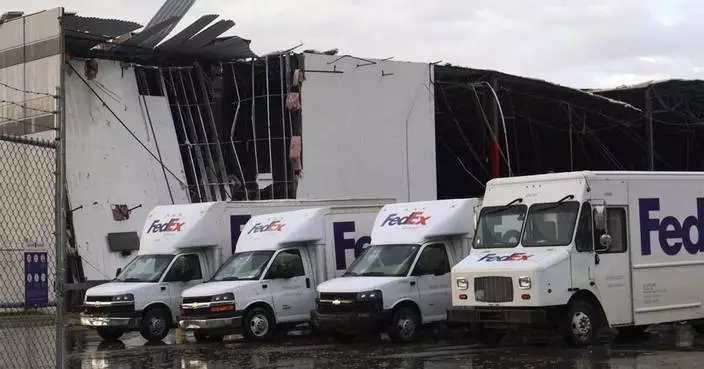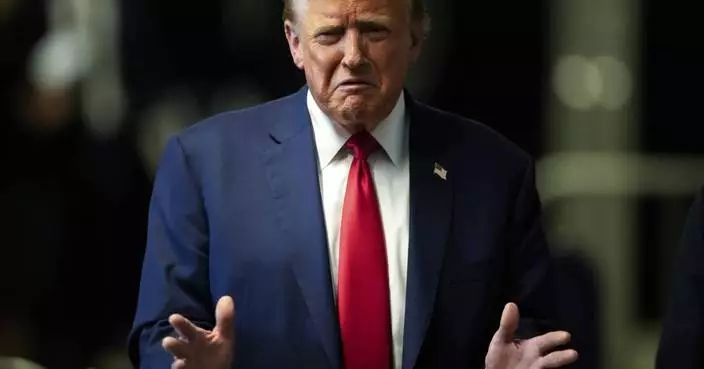Last year, much of Hawaii was shocked to learn a Chicago restaurant chain owner had trademarked the name "Aloha Poke" and wrote to cubed fish shops around the country demanding that they stop using the Hawaiian language moniker for their own eateries. The cease-and-desist letters targeted a downtown Honolulu restaurant and a Native Hawaiian-operated restaurant in Anchorage, among others.
Now, Hawaii lawmakers are considering adopting a resolution calling for the creation of legal protections for Native Hawaiian cultural intellectual property. The effort predates Aloha Poke, but that episode is lending a sense of urgency to a long-festering concern not unfamiliar to native cultures in other parts of the world.
Click to Gallery
Last year, much of Hawaii was shocked to learn a Chicago restaurant chain owner had trademarked the name "Aloha Poke" and wrote to cubed fish shops around the country demanding that they stop using the Hawaiian language moniker for their own eateries. The cease-and-desist letters targeted a downtown Honolulu restaurant and a Native Hawaiian-operated restaurant in Anchorage, among others.
The resolution calls on state agencies and Native Hawaiian organizations to form a task force to develop a legal system to "recognize and protect" Native Hawaiian cultural intellectual property and traditional cultural expressions. It also seeks protections for genetic resources, such as taro, a traditional crop that legend says is an ancestor of the Hawaiian people and that scientists have tried to genetically engineer in the past.
The Aloha Poke incident echoes past disputes, like when a non-Hawaiian photographer claimed copyright over an image of a woman dancing hula and Disney copyrighted a modified version of a Hawaiian chant used in a movie.
Aloha Poke CEO Chris Birkinshaw didn't return messages seeking comment left at his West Madison store in Chicago and on the company's website. The company has stores in Illinois, Wisconsin, Minnesota, Florida and Washington, D.C.
Native Hawaiian experts note there's a cultural clash underlying much of this. Modern European-based traditions use trademarks, copyright and patents to create economic incentives and rewards for creating knowledge and culture. Indigenous culture, on the other hand, is often passed on through generations and held collectively.
"At the least, they need to have some cultural sensitivity about how it's used. And they need to know you can't be telling Native Hawaiian businesses they can't use their own language," Lewis said.
"He said this is a great program because so many times the Native artwork gets commercialized or used by someone else," she said.
"I was frustrated at the audacity of people from outside of our community using these legal mechanisms to basically bully people from our local community out of utilizing symbols and words that are important to our culture," said state Sen. Jarrett Keohokalole, a Native Hawaiian representing Kaneohe and Heeia.
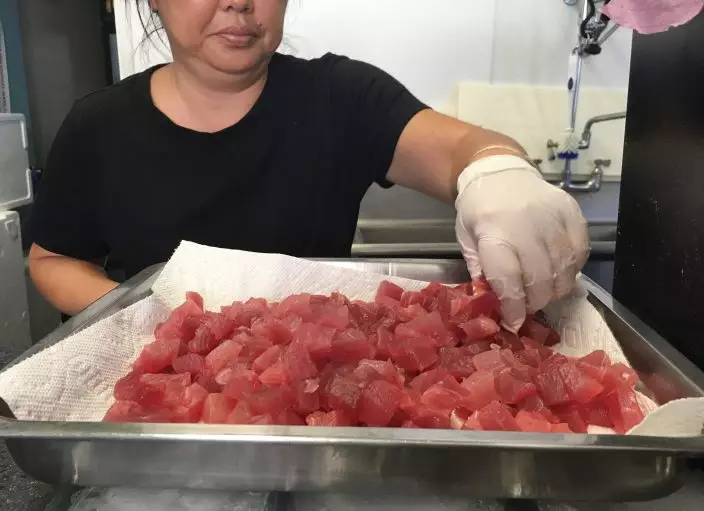
This Tuesday, April 16, 2019 photo shows Michele Miyanaga preparing cubes of raw ahi, or tuna, at Aloha Poke Shop, a store in Honolulu that received a letter from Chicago-based Aloha Poke Co. saying the Illinois company had trademarked "Aloha Poke" and the Hawaii company would need to change its name. Hawaii lawmakers are considering adopting a resolution calling for the creation of legal protections for Native Hawaiian cultural intellectual property. (AP PhotoAudrey McAvoy)
The resolution calls on state agencies and Native Hawaiian organizations to form a task force to develop a legal system to "recognize and protect" Native Hawaiian cultural intellectual property and traditional cultural expressions. It also seeks protections for genetic resources, such as taro, a traditional crop that legend says is an ancestor of the Hawaiian people and that scientists have tried to genetically engineer in the past.
The task force would be commissioned to submit its recommendations and any proposed legislation to lawmakers in three years.
The resolution has passed House and Senate committees. The full Senate is scheduled to vote on it Monday.

This Friday, April 12, 2019 photo shows Healani Sonoda-Pale, chairwoman of the Ka Lahui Hawaii political action committee, wearing a T-shirt saying "Aloha Not for Sale" in Honolulu. Hawaii lawmakers are considering adopting a resolution calling for the creation of legal protections for Native Hawaiian cultural intellectual property. (AP PhotoAudrey McAvoy)
The Aloha Poke incident echoes past disputes, like when a non-Hawaiian photographer claimed copyright over an image of a woman dancing hula and Disney copyrighted a modified version of a Hawaiian chant used in a movie.
Chicago's Aloha Poke Co. chose as its battleground the word "aloha" — a term meaning love, compassion, kindness as well as hello and goodbye. It's a term central to how Native Hawaiians treat others and how many in Hawaii — Native Hawaiian or not — try to live.
"It's traumatic when things like this happen to us — when people try to take, modify or steal what's been in our people's world view for generations," said Healani Sonoda-Pale, chairwoman of the Ka Lahui Hawaii political action committee, who testified in support of the resolution.

This Tuesday, April 16, 2019 photo shows a sign inside Aloha Poke Shop, a store in Honolulu that received a letter from Chicago-based Aloha Poke Co. saying the Illinois company had trademarked "Aloha Poke" and the Hawaii company would need to change its name. Hawaii lawmakers are considering adopting a resolution calling for the creation of legal protections for Native Hawaiian cultural intellectual property. (AP PhotoAudrey McAvoy)
Aloha Poke CEO Chris Birkinshaw didn't return messages seeking comment left at his West Madison store in Chicago and on the company's website. The company has stores in Illinois, Wisconsin, Minnesota, Florida and Washington, D.C.
Aloha Poke Shop in Honolulu initially ignored the Chicago company's letter, said co-founder Jeff Sampson. When the issue burst into the news, he and his partners had an attorney write their Chicago counterpart saying they wouldn't change their name. They explained there would be no confusion between their businesses because they operated far from the mainland company's stores.
But a poke store in Anchorage run by a Native Hawaiian woman changed its name to Lei's Poke Stop after receiving one of the letters.

This Tuesday, April 16, 2019, photo shows merchandise at Aloha Poke Shop, a store in Honolulu that received a letter from Chicago-based Aloha Poke Co. saying the Illinois company had trademarked "Aloha Poke" and the Hawaii company would need to change its name. Hawaii lawmakers are considering adopting a resolution calling for the creation of legal protections for Native Hawaiian cultural intellectual property. (AP PhotoAudrey McAvoy)
Native Hawaiian experts note there's a cultural clash underlying much of this. Modern European-based traditions use trademarks, copyright and patents to create economic incentives and rewards for creating knowledge and culture. Indigenous culture, on the other hand, is often passed on through generations and held collectively.
"They're never going to sit nicely together in a box," said Kuhio Lewis, the CEO of the Council for Native Hawaiian Advancement.
It will be difficult to determine who would decide who can use Native Hawaiian culture and who would be able to use it. Limits may violate the First Amendment of the U.S. Constitution. The task force will have to explore who can do what, Lewis said.
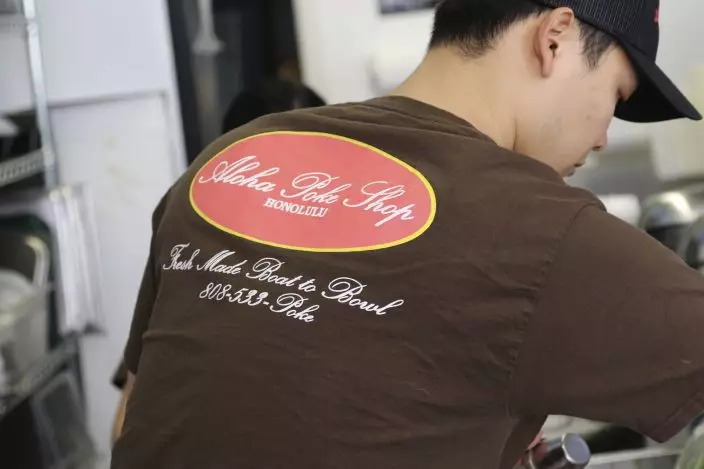
This Tuesday, April 16, 2019, photo shows Ryne Aniya preparing food before the lunch rush at Aloha Poke Shop, a store in Honolulu that received a letter from Chicago-based Aloha Poke Co. saying the Illinois company had trademarked "Aloha Poke" and the Hawaii company would need to change its name. Hawaii lawmakers are considering adopting a resolution calling for the creation of legal protections for Native Hawaiian cultural intellectual property. (AP PhotoAudrey McAvoy)
"At the least, they need to have some cultural sensitivity about how it's used. And they need to know you can't be telling Native Hawaiian businesses they can't use their own language," Lewis said.
The resolution points to potential models in New Zealand and Alaska, which both created signifiers that indigenous people may place on their art as a mark of authenticity.
Marie Texter of Anchorage said her late father Andy Makar — who drew, made carvings from tusks, cottonwood and horns, and sewed animal skins — was a strong believer in the Silver Hand seal for Alaska Natives.
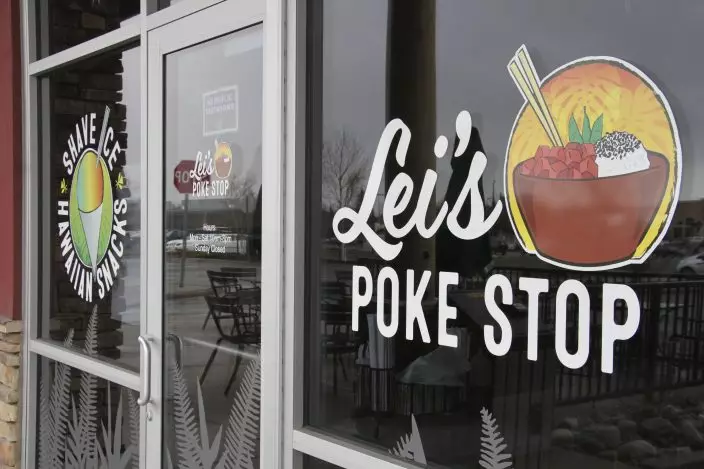
The exterior of Lei's Poke Stop is seen Wednesday, April 17, 2019, in Anchorage, Alaska. Hawaii lawmakers are considering adopting a resolution calling for the creation of legal protections for Native Hawaiian cultural intellectual property. The move comes after a Chicago restaurant chain owner shocked the island state by trademarking the name "Aloha Poke" and sending letters to similarly named cubed fish shops around the country demanding that they change their names, including this Anchorage store, which changed its name. (AP PhotoMark Thiessen)
"He said this is a great program because so many times the Native artwork gets commercialized or used by someone else," she said.
He had to fill out proof of his Indian blood — he was mostly Yup'ik but his mother was Athabascan — to apply.
But Rosita Worl, president of Juneau-based Sealaska Heritage Institute, said not all Alaska Native artists apply for or use the emblem. Nor does the program deter the sale of bogus Native art made overseas, she said. It also lacks enforcement and publicity, she said.

The exterior of Lei's Poke Stop, at left, is seen Wednesday, April 17, 2019, in Anchorage, Alaska. Hawaii lawmakers are considering adopting a resolution calling for the creation of legal protections for Native Hawaiian cultural intellectual property. The move comes after a Chicago restaurant chain owner shocked the island state by trademarking the name "Aloha Poke" and sending letters to similarly named cubed fish shops around the country demanding that they change their names, including this Anchorage store, which changed its name. (AP PhotoMark Thiessen)
Charles E. Colman, a University of Hawaii law professor, said such programs hold up under federal law because they don't prohibit people from making work that resembles indigenous art. They merely won't allow people to say their work is produced by an indigenous person if it's not.
Colman believes the Aloha Poke situation, on the other hand, could be addressed within existing trademark law.
He believes the Chicago company's trademark could be cancelled if challenged because it's not so well-known that its name has developed a secondary meaning the way the words in the retailer name "Best Buy" have, for example.
"You can't just register a descriptive phrase unless you've achieved a certain amount of public recognition," he said.
Associated Press journalists Rachel D'Oro and Mark Thiessen in Anchorage contributed to this report.
WASHINGTON (AP) — The Biden administration paused a shipment of bombs to Israel last week over concerns that the country was approaching a decision on launching a full-scale assault on the southern Gaza city of Rafah against the wishes of the United States, Defense Secretary Lloyd Austin said Wednesday.
The shipment was supposed to consist of 1,800 2,000-pound (900-kilogram) bombs and 1,700 500-pound (225-kilogram) bombs, according to the official who spoke on the condition of anonymity to discuss the sensitive matter. The focus of U.S. concern was the larger explosives and how they could be used in a dense urban setting like Rafah where more than 1 million civilians are sheltering after evacuating other parts of Gaza amid Israel’s war on Hamas, which came after the militant group’s deadly attack on Israel on Oct. 7.
Austin confirmed the weapons delay, telling the Senate Appropriations subcommittee on defense that the U.S. paused “one shipment of high payload munitions.”
“We’re going to continue to do what’s necessary to ensure that Israel has the means to defend itself,” Austin said. “But that said, we are currently reviewing some near-term security assistance shipments in the context of unfolding events in Rafah.”
The U.S. has historically provided enormous amounts of military aid to Israel. That has only accelerated in the aftermath of Hamas’ Oct. 7 attack that killed some 1,200 in Israel and led to about 250 being taken captive by militants. The pausing of the aid shipment is the most striking manifestation of the growing daylight between Israel Prime Minister Benjamin Netanyahu’s government and the administration of Democratic President Joe Biden, which has called on Israel to do far more to protect the lives of innocent civilians in Gaza.
It also comes as the Biden administration is due to deliver a first-of-its-kind formal verdict this week on whether the airstrikes on Gaza and restrictions on delivery of aid have violated international and U.S. laws designed to spare civilians from the worst horrors of war. A decision against Israel would further add to pressure on Biden to curb the flow of weapons and money to Israel’s military.
Biden signed off on the pause in an order conveyed last week to the Pentagon, according to U.S. officials who were not authorized to comment on the matter. The White House National Security Council sought to keep the decision out of the public eye for several days until it had a better understanding of the scope of Israel’s intensified military operations in Rafah and until Biden could deliver a long-planned speech on Tuesday to mark Holocaust Remembrance Day.
Biden’s administration in April began reviewing future transfers of military assistance as Netanyahu’s government appeared to move closer toward an invasion of Rafah, despite months of opposition from the White House. The official said the decision to pause the shipment was made last week and no final decision had been made yet on whether to proceed with the shipment at a later date.
U.S. officials had declined for days to comment on the halted transfer, word of which came as Biden on Tuesday described U.S. support for Israel as “ironclad, even when we disagree.”
Press secretary Karine Jean-Pierre declined to square the arms holdup with Biden’s rhetoric in support of Israel, saying only, “Two things could be true.”
Israel’s ambassador to the United Nations, Gilad Erdan, in an interview with Israeli Channel 12 TV news, said the decision to pause the shipment was “a very disappointing decision, even frustrating." He suggested the move stemmed from political pressure on Biden from Congress, the U.S. campus protests and the upcoming election.
Biden has faced pressure from some on the left — and condemnation from the critics on the right who say Biden has moderated his support for an essential Mideast ally.
“If we stop weapons necessary to destroy the enemies of the state of Israel at a time of great peril, we will pay a price,” said Sen. Lindsey Graham, R-S.C., his voice rising in anger during an exchange with Austin. “This is obscene. It is absurd. Give Israel what they need to fight the war they can’t afford to lose.”
Independent Sen. Bernie Sanders of Vermont, a Biden ally, said in a statement the pause on big bombs must be a “first step.”
“Our leverage is clear,” Sanders said. “Over the years, the United States has provided tens of billions of dollars in military aid to Israel. We can no longer be complicit in Netanyahu’s horrific war against the Palestinian people.”
Austin, meanwhile, told lawmakers that "it’s about having the right kinds of weapons for the task at hand.”
"A small diameter bomb, which is a precision weapon, that’s very useful in a dense, built-up environment,” he said, “but maybe not so much a 2,000-pound bomb that could create a lot of collateral damage.” He said the U.S. wants to see Israel do “more precise” operations.
Israeli troops on Tuesday seized control of Gaza’s vital Rafah border crossing in what the White House described as a limited operation that stopped short of the full-on Israeli invasion of the city that Biden has repeatedly warned against on humanitarian grounds, most recently in a Monday call with Netanyahu.
Israel has ordered the evacuation of 100,000 Palestinians from the city. Israeli forces have also carried out what it describes as “targeted strikes” on the eastern part of Rafah and captured the Rafah crossing, a critical conduit for the flow of humanitarian aid along the Gaza-Egypt border.
Privately, concern has mounted inside the White House about what’s unfolding in Rafah, but publicly administration officials have stressed that they did not think the operations had defied Biden’s warnings against a widescale operation in the city.
The State Department is separately considering whether to approve the continued transfer of Joint Direct Attack Munition kits, which place precision guidance systems onto bombs, to Israel, but the review didn’t pertain to imminent shipments.
The U.S. dropped the 2,000-pound bomb sparingly in its long war against the Islamic State militant group. Israel, by contrast, has used the bomb frequently in the seven-month Gaza war. Experts say the use of the weapon, in part, has helped drive the enormous Palestinian casualty count that the Hamas-run health ministry puts at more than 34,000 dead, though it doesn’t distinguish between militants and civilians.
The U.S.-Israel relationship has been close through both Democratic and Republican administrations. But there have been other moments of deep tension since Israel's founding in which U.S. leaders have threatened to hold up aid in attempt to sway Israeli leadership.
President Dwight Eisenhower pressured Israel with the threat of sanctions into withdrawing from the Sinai in 1957 in the midst of the Suez Crisis. Ronald Reagan delayed the delivery of F16 fighter jets to Israel at a time of escalating violence in the Middle East. President George H.W. Bush held up $10 billion in loan guarantees to force the cessation of Israeli settlement activity in the occupied territories.
__
Associated Press writers Josef Federman in Jerusalem and Lolita C. Baldor and Matthew Lee contributed to this report.
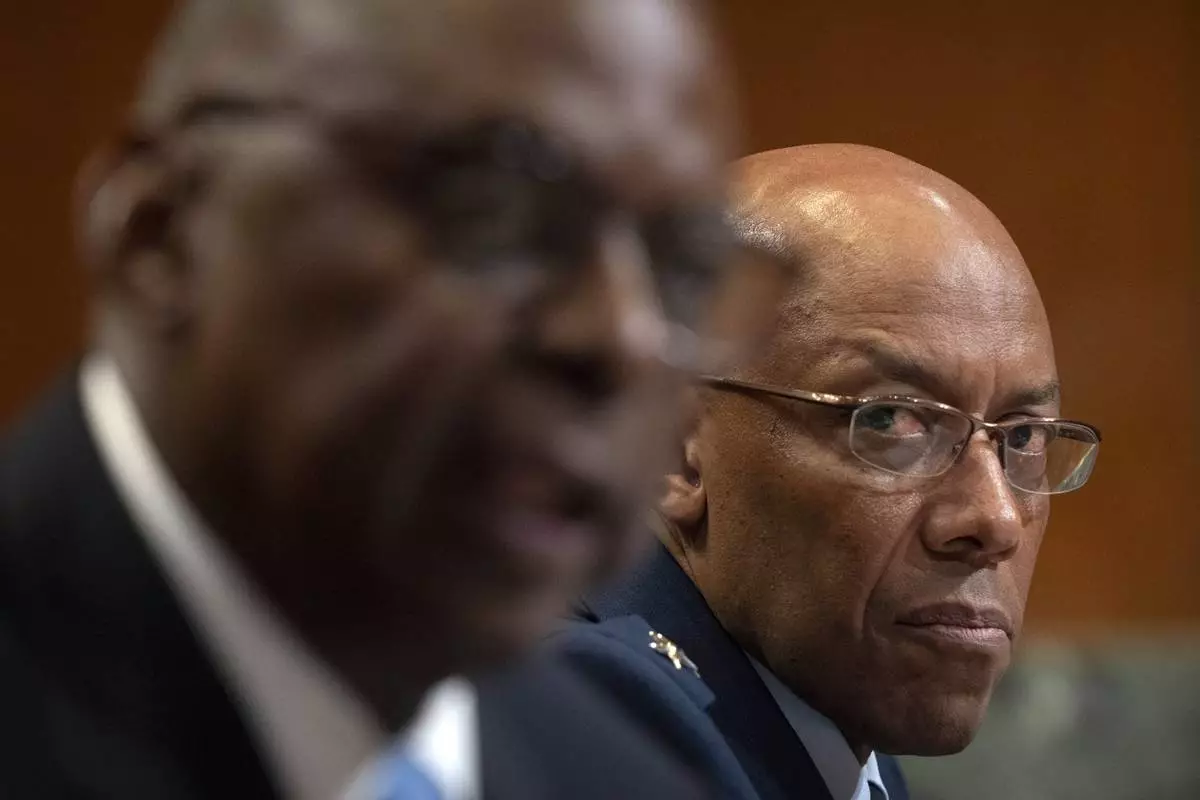
Chairman of the Joint Chiefs of Staff Air Force Gen. CQ Brown, right, listens as Secretary of Defense Lloyd Austin, left, speaks during a hearing of the Senate Appropriations Committee Subcommittee on Defense on Capitol Hill, Wednesday, May 8, 2024, in Washington. (AP Photo/Mark Schiefelbein)

Protestors opposed to the war between Israel and Hamas stand before a hearing of the Senate Appropriations Committee Subcommittee on Defense with Secretary of Defense Lloyd Austin and Chairman of the Joint Chiefs of Staff Air Force Gen. CQ Brown on Capitol Hill, Wednesday, May 8, 2024, in Washington. (AP Photo/Mark Schiefelbein)

Sen. Lindsey Graham, R-S.C., speaks during a hearing of the Senate Appropriations Committee Subcommittee on Defense with Secretary of Defense Lloyd Austin and Chairman of the Joint Chiefs of Staff Air Force Gen. CQ Brown on Capitol Hill, Wednesday, May 8, 2024, in Washington. (AP Photo/Mark Schiefelbein)
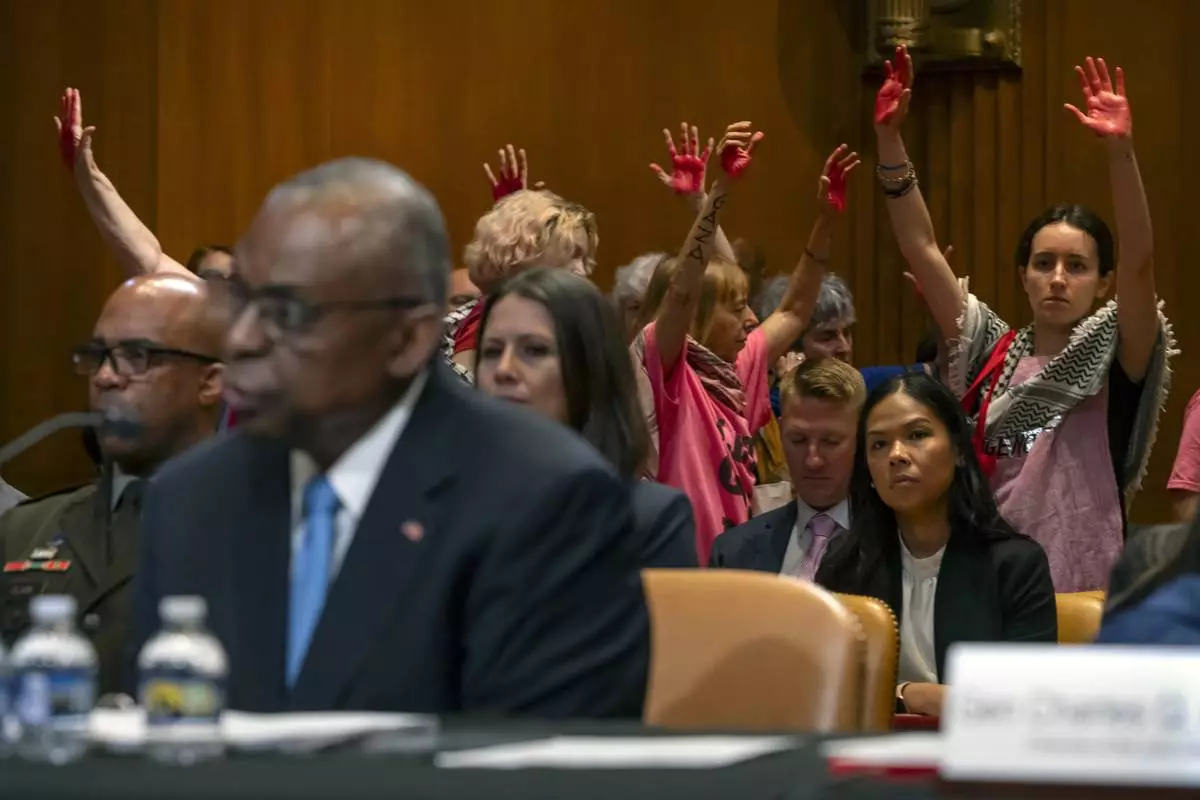
Protestors opposed to the Israel-Hamas war are escorted out as Secretary of Defense Lloyd Austin, left, speaks during a hearing of the Senate Appropriations Committee Subcommittee on Defense on Capitol Hill, Wednesday, May 8, 2024, in Washington. (AP Photo/Mark Schiefelbein)

Secretary of Defense Lloyd Austin attends a hearing of the Senate Appropriations Committee Subcommittee on Defense on Capitol Hill, Wednesday, May 8, 2024, in Washington. (AP Photo/Mark Schiefelbein)

White House press secretary Karine Jean-Pierre speaks during a briefing at the White House, Tuesday, May 7, 2024, in Washington. (AP Photo/Evan Vucci)

President Joe Biden speaks at the U.S. Holocaust Memorial Museum's Annual Days of Remembrance ceremony at the U.S. Capitol, Tuesday, May 7, 2024 in Washington. (AP Photo/Evan Vucci)

Pentagon chief confirms US has paused bomb shipment to Israel to signal concerns over Rafah invasion

Pentagon chief confirms US has paused bomb shipment to Israel to signal concerns over Rafah invasion

Smoke rises following an Israeli airstrike east of Rafah, Gaza Strip, Monday, May 6, 2024. (AP Photo/Ismael Abu Dayyah)




















